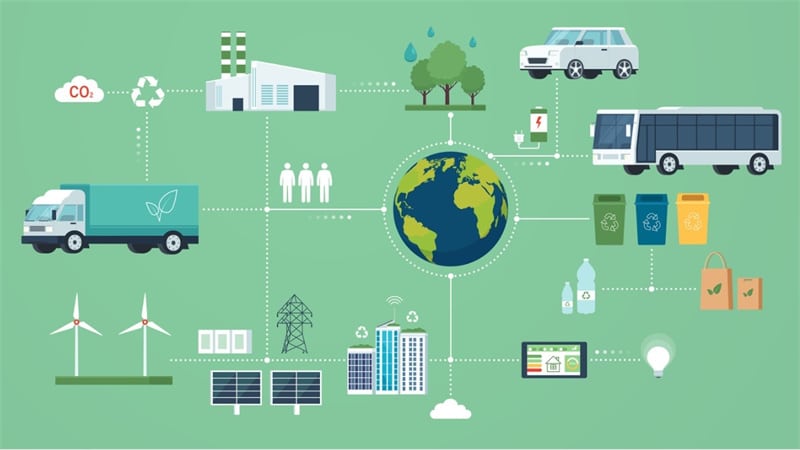
Discover how cloud-based ERP systems are revolutionizing sustainable manufacturing. Learn how they drive efficiency, reduce environmental impact, and support regulatory compliance for a greener future.
The Role Of Cloud ERP In Sustainable Manufacturing
Manufacturing companies today face immense pressure to adopt sustainable practices that reduce their environmental impact. With rising costs and complex supply chains, manufacturers need technology solutions that enable sustainability without compromising efficiency and profitability.
This is where cloud-based manufacturing ERP comes in. Cloud ERP provides the visibility, analytics, and collaboration capabilities to help manufacturers embed sustainability into their operations in a cost-effective way.
In this article, we will examine the role of cloud ERP in enabling sustainable manufacturing across key areas like energy management, waste reduction, compliance management, and supply chain sustainability. With the right technology approach, manufacturers can drive innovation in their sustainability initiatives to create value for the business while also benefiting the environment.
Energy Management

As one of the most energy-intensive sectors, manufacturing has significant potential to reduce environmental impact through better energy management. Cloud ERP provides the tools to monitor energy usage, optimize consumption, and support renewable energy – helping manufacturers improve sustainability.
With real-time energy data and analytics, manufacturers can identify opportunities to lower energy costs and their carbon footprint.
- Monitor And Optimize Energy Usage
One of the biggest ways cloud-based manufacturing ERP supports sustainability is through better energy management capabilities. With real-time energy monitoring and analytics, you can track energy usage on the production floor and quickly identify opportunities for optimization.
Cloud ERP gives you visibility into which processes, machines, and facilities are the biggest energy hogs so you can target your efficiency efforts for maximum impact.
- Automate Equipment Shutdowns
Many manufacturers waste energy simply by leaving equipment and facilities running when not in use. Cloud ERP allows you to schedule equipment shutdowns automatically during non-production times.
This ensures assets power down when not needed instead of sucking energy around the clock. The system can even stagger equipment startups to avoid energy spikes.
- Support Renewable Energy Initiatives
For manufacturers looking to adopt renewable energy sources like solar and wind, cloud ERP provides the data foundation needed to determine viability, plan installations, and measure ongoing performance.
With cloud ERP supply chain data, you can identify facilities best suited for renewable energy projects based on location, energy demands, and other factors.
Waste Reduction
Reducing waste in manufacturing processes and across supply chains is a key sustainability priority for manufacturers today. Cloud-based ERP enables better tracking and management of waste streams to minimize what goes to landfills.
With inventory optimization and demand forecasting tools, manufacturers can also cut waste by eliminating excess production, obsolete parts, and unneeded inventory.
- Boost Recycling And Reuse
Cloud ERP gives manufacturers real-time visibility and tracking capabilities to better manage waste streams for recycling and reuse. Barcoding, RFID tags, and inventory management help accurately track waste products, byproducts, and scraps to minimize what goes to landfills.
With cloud ERP data, you can identify waste reduction opportunities and continuously improve recycling programs over time.
- Optimize Inventory To Cut Waste
Excess and obsolete inventory often leads to waste in manufacturing. Cloud-based ERP provides inventory optimization tools to align supply with actual demand. By eliminating the guesswork, you can significantly cut overproduction and its resulting waste.
Capabilities like demand forecasting, inventory optimization, and real-time inventory visibility all enable leaner, more sustainable manufacturing.
Compliance Management
Staying compliant with constantly evolving environmental regulations is a major challenge manufacturers face in their sustainability programs. Cloud ERP centralizes compliance data and automates reporting to simplify tracking and managing global EHS mandates.
With tools to monitor sustainability KPIs and emissions, manufacturers can efficiently collect data needed for regulatory submissions and ensure standards are met across facilities.
- Manage EHS Regulations And Reporting
Environmental health and safety (EHS) regulations impose significant compliance requirements on manufacturers. Cloud ERP offers a centralized platform to track EHS mandates across global operations and automate regulatory reporting tasks.
With sustainability performance monitoring and carbon accounting tools, manufacturers can efficiently collect compliance data and generate reports for submission to environmental agencies.
- Standardize Global Sustainability Processes
For global manufacturers, cloud ERP enables standardized sustainability best practices across the enterprise. A single cloud platform with built-in sustainability KPIs and dashboards makes it easier to implement recycled content programs, chemical management processes, energy policies, and other green initiatives consistently worldwide.
The transparency and collaboration capabilities keep everyone aligned.
Supply Chain Sustainability

Sustainability initiatives extend beyond the four walls of the factory throughout the supply chain. Cloud ERP enables manufacturers to assess supplier sustainability, collaborate on green innovation, and reduce carbon footprints across their network of partners.
- Assess Supplier Sustainability
With cloud ERP supply chain management functionality, manufacturers gain insight into supplier sustainability practices for smarter procurement.
Review energy usage, waste generation, carbon emissions, labor policies, and other supplier metrics in the ERP system to identify opportunities for reducing environmental impact. Cloud ERP makes it possible to weigh sustainability alongside cost and quality in selecting optimal suppliers.
- Enable Sustainable Innovation
Sharing real-time sustainability data across the value chain drives innovation for environmentally conscious products and processes. Cloud ERP provides the visibility and collaboration platform for manufacturers, suppliers, and customers to co-innovate on ideas like eco-design, green chemistry, resource efficiency, recyclability, and more.
With the entire network contributing on a cloud platform, manufacturers can deliver innovative sustainability solutions faster.
Conclusion
The environmental and social imperatives of sustainable manufacturing will only grow in importance in the years ahead. Cloud ERP emerges as a powerful enabler for manufacturers to embed sustainability into their operations in a holistic way.
With real-time data, analytics, and networked collaboration on a cloud platform, manufacturers can drive greater efficiency, transparency, and innovation in their sustainability initiatives. The time for action is now to leverage cloud ERP and transform manufacturing for a greener future.










